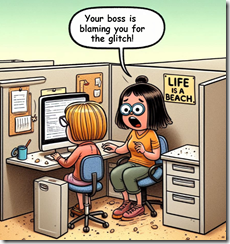Another Big Consulting Firms Does Smart Software… Sort Of
September 3, 2024
 This essay is the work of a dumb dinobaby. No smart software required.
This essay is the work of a dumb dinobaby. No smart software required.
Will programmers and developers become targets for prosecution when flaws cripple vital computer systems? That may be a good idea because pointing to the “algorithm” as the cause of a problem does not seem to reduce the number of bugs, glitches, and unintended consequences of software. A write up which itself may be a blend of human and smart software suggests change is afoot.
Thanks, MSFT Copilot. Good enough.
“Judge Rules $400 Million Algorithmic System Illegally Denied Thousands of People’s Medicaid Benefits” reports that software crafted by the services firm Deloitte did not work as the State of Tennessee assumed. Yep, assume. A very interesting word.
The article explains:
The TennCare Connect system—built by Deloitte and other contractors for more than $400 million—is supposed to analyze income and health information to automatically determine eligibility for benefits program applicants. But in practice, the system often doesn’t load the appropriate data, assigns beneficiaries to the wrong households, and makes incorrect eligibility determinations, according to the decision from Middle District of Tennessee Judge Waverly Crenshaw Jr.
At one time, Deloitte was an accounting firm. Then it became a consulting outfit a bit like McKinsey. Well, a lot like that firm and other blue-chip consulting outfits. In its current manifestation, Deloitte is into technology, programming, and smart software. Well, maybe the software is smart but the programmers and the quality control seem to be riding in a different school bus from some other firms’ technical professionals.
The write up points out:
Deloitte was a major beneficiary of the nationwide modernization effort, winning contracts to build automated eligibility systems in more than 20 states, including Tennessee and Texas. Advocacy groups have asked the Federal Trade Commission to investigate Deloitte’s practices in Texas, where they say thousands of residents are similarly being inappropriately denied life-saving benefits by the company’s faulty systems.
In 2016, Cathy O’Neil published Weapons of Math Destruction. Her book had a number of interesting examples of what goes wrong when careless people make assumptions about numerical recipes. If she does another book, she may include this Deloitte case.
Several observations:
- The management methods used to create these smart systems require scrutiny. The downstream consequences are harmful.
- The developers and programmers can be fired, but the failure to have remediating processes in place when something unexpected surfaces must be part of the work process.
- Less informed users and more smart software strikes me as a combustible mixture. When a system ignites, the impacts may reverberate in other smart systems. What entity is going to fix the problem and accept responsibility? The answer is, “No one” unless there are significant consequences.
The State of Tennessee’s experience makes clear that a “brand name”, slick talk, an air of confidence, and possibly ill-informed managers can do harm. The opioid misstep was bad. Now imagine that type of thinking in the form of a fast, indifferent, and flawed “system.” Firing a 25 year old is not the solution.
Stephen E Arnold, September 3, 2024



